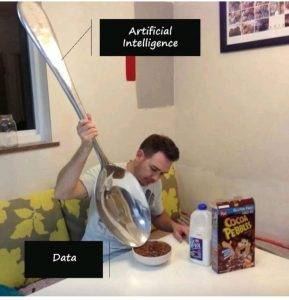The most successful technology leaders will be those who can adaptively integrate data analytics and AI, balancing immediate needs with long-term vision. In time, the question may even shift from “Which comes first?” to “How can we achieve Big Data Analytics and AI Synergy? And our objectives?”
In March 2024, Advisia Group conducted a study with IBM Indonesia and an AI industry interest group, KORIKA, to try to understand the role of AI in Indonesia’s business landscape. After in-depth interviews and an online survey of up to 50 professionals from banking, manufacturing, and non-banking sectors, the findings of the study revealed challenges.
One of the main challenges highlighted is the effective management of big data to inform decisions, to manage risks, and give responses in real-time. The report underscored the importance of developing robust data management strategies, as well as AI algorithms, to be able to process and analyze large volumes of data efficiently.
Five points-of-view
The interplay between data analytics and artificial intelligence (AI) has become a focal point of discussion among IT decision-makers.

If you are a tech decision maker who feels this way sometimes… read on.
As companies strive to harness the power of these technologies, a crucial question emerges: Is data analytics a necessary precursor to AI deployment in an organization? We’ve gathered insights from five IT leaders to shed some light on how organizations can proceed.
Data primacy and AI’s superiority
Boey Yan Yee, a seasoned regional IT leader, strongly advocates for the primacy of data analytics. “Data analytics ensures high-quality data, provides valuable insights, and aligns AI models with business objectives. Therefore, in most cases, data analytics is a necessary and beneficial foundation before deploying AI,” she asserts.

Boey Yan Yee, Sterling
Yan Yee emphasized the critical role of data quality and data readiness, domain knowledge, and understanding data patterns as key components of this foundation. “Before deploying AI, businesses need to make data-driven decisions about which problems to solve and how AI can provide value. Data analytics is essential for making these decisions and defining business context. ”

Alain Boey, MCION Advisor
Alain Boey, a chief transformation officer, acknowledges there is interdependence between data and AI, while highlighting AI’s superior capabilities. “AI is very dependent on data. If data is rubbish, the results are also rubbish. Data analytics is limited compared to AI. Both are dependent on data. However, AI’s breadth and capability far exceed data analytics,” he explained. This view suggests that data quality is crucial, and that AI’s potential surpasses that of data analytics.
Agility, quick wins, and going back to basics

Kenneth Khong, healthcare
Kenneth Khong, a group technology leader in the healthcare industry, presents a more flexible stance. “AI is becoming fundamental now for companies who believe in using tech to remain competitive. Data Analytics is not a necessary prerequisite for AI but would help,” he stated. This perspective opens the door to various implementation strategies that recognize existing data programs can enhance AI initiatives, for example it could make available better quality data for machine learning.
Before deploying AI, businesses need to make data-driven decisions about which problems to solve and how AI can provide value.
Offering a holistic view, Dominic Yew, a seasoned CISO in the banking industry, challenges the notion of a fixed path to AI adoption. “There is no fixed path to the adoption and implementation of AI. Fundamentally, there needs to be strong business case(s) and objectives that AI can be used to address a pain point or challenges faced by the business,” he argued.
Dominic’s insight underscores the importance of aligning AI initiatives with specific business needs, potentially bypassing extensive, end-to-end data lifecycle management and governance practices in favor of agile and hybrid approaches like leveraging pre-trained models and synthetic instead of proprietary data.

Dominic Yew, banking
A company that builds from the ground up faces potential risk of losing its competitive edge and losing interest from business sponsors due to non-discernible results. There could even be organization resistance because of the large magnitude changes required for data governance and management.

Adrian Goh, banking
Adrian Goh who spearheads the digital platform of a banking group, distills the discussion to its essence with a concise observation: “Data analytics is not the foundation, however data collection is the foundation.” This statement refocuses the debate on the fundamental importance of data itself, rather than the technology processes applied to it.
Context and perspectives
These diverse perspectives reveal a nuanced reality: the relationship between data analytics and AI in marketing is not a one-size-fits-all proposition. While data quality and understanding remain crucial, the path to leveraging these technologies effectively varies based on organizational context, objectives, and resources.
Rather than adhering to a rigid framework, developing a flexible, strategic approach that aligns technology adoption with specific business goals seems more plausible. Whether building on a robust data analytics foundation or diving directly into AI applications, the focus should remain on creating value, driving innovation, and enhancing customer experiences.








